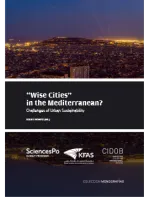Energy Transition and Urban Governance in the Arab World

The 2015 Paris Agreement and the recent Quito New Urban Agenda both emphasised the need to empower cities in climate change policies, including energy policies that aim at energy transitions towards more energy efficiency and the use of renewable energies. This call is often justified by the fact that cities now house more than half of the global population and are responsible for more than 75% of greenhouse gas (GHG) emissions. Economic activities and wealth are also mainly concentrated in cities. In addition, many studies point to the increased vulnerability of cities because of the rise in urban temperatures, which could make summer life in many Arab cities unbearable. Rising sea levels are also expected to threaten a number of maritime cities, among them many Arab capitals and large cities. Being both factors in and potential victims of climate change, cities have many reasons to act. Therefore, there is a need to examine how changes in urban governance could indeed address this necessity and the challenge cities have to face.